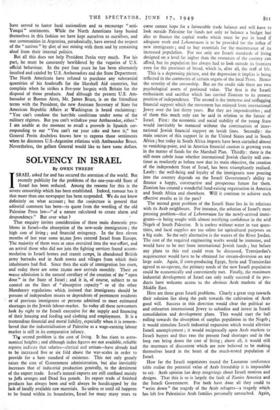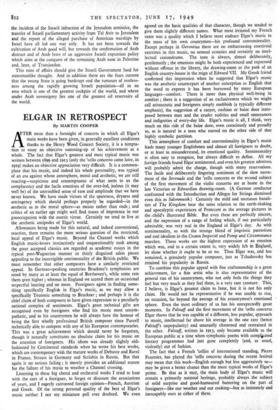SOLVENCY IN ISRAEL
By OWEN TWEEDY
ISRAEL asked for and has secured the attention of the world. But recently publicity for the problems of the one-year-old State of Israel has been reduced. Among the reasons for this is the severe censorship which has been established. Indeed, rumour has it that more than one newspaper has been suspended. We do not know definitely on what account ; but the conjecture is general that editorial comment has been—to quote from the wording of the old Palestine Press law—" of a nature calculated to create alarm and despondency." But over what ?
That enquiry invites consideration of three main domestic pro- blems in Israel—the absorption of the new-scale immigration ; the high cost of living ; and financial stringency. In the first eleven months of last year some 92,000 Jews entered Israel from Europe. The majority of them were at once recruited into the war-effort, and on arrival those who did not join the fighting services found accom- modation in Israeli homes and transit camps, in abandoned British army barracks and in Arab towns and villages from which their inhabitants had fled. Since then the scale of immigration has risen, and today there are some 20,000 new arrivals monthly. Their en masse admission is the natural corollary of the creation of the "open door " in the State of Israel ; and it is, of course, subject to no control on the lines of " absorptive capacity " or of the other Mandatory regulations which insisted that immigrants should be persons of independent means or dependents of permanent residents or of previous immigrants or persons admitted to meet estimated shortages in the Jewish labour-market. So today all these newcomers look by right- to the Israeli executive for the supply and financing of their housing and feeding and clothing and employment. It is a tremendous financial and moral liability, especially when it is remem- bered that the industrialisation of Palestine as a wage-earning labour market is still in its comparative infancy.
The second problem is the cost of living. It has risen to astro- nomical heights ; and although index figures are not available, reliable reports indicate that salaries—clerical and artisan—have already had to be increased five or six fold above the war-scales in order to provide for a bare standard of existence. This not only greatly raises the cost of Government administration, but also inevitably increases that of industrial production generally, to the detriment of the export trade. Israel's natural exports are still confined mainly to Jaffa oranges and Dead Sea potash. Its export trade of finished products has always been and will always be handicapped by the lack of locally available raw materials. So unless or until oil happens to be found within its boundaries, Israel for many many years to
come cannot hope for a favourable trade balance and will have to look outside Palestine for funds not only to balance a budget but also to finance the capital works which must be put in hand if adequate work and Lebensraum is to be provided for the influx of new immigrants ; and to buy essentials for the maintenance of its increased population. For not only are Israeli standards of living designed on a level far higher than the resources of the country can afford, but its population has always had to look outside its frontiers even for the provision of bread, which is, after all, the staff of life.
This is a depressing picture, and the depression it implies is being reflected in the comments of certain organs of the local Press. Hence the severity of the censorship. But on the credit side there are two psychological assets of profound value. The first is the Israeli enthusiasm and sacrifice which has carried Zionism to its present position of independence. The second is the immense and unflagging financial support which the movement has enjoyed from international Jewry over the last thirty years. But they are imponderables ; and of them this much only can be said in relation to the future of Israel. First : the economic and social stability of the young State would inevitably be menaced without the continuation of inter- national Jewish financial support on lavish lines. Secondly : the main sources of this support lie in the United States and in South Africa ; but today in South Africa imports have been curtailed almost to vanishing-point, and in America financial caution is growing even in the matter of funds for the Marshall Plan. Thirdly : there is the still more subtle issue whether international Jewish charity will con- tinue as resolutely as before now that its main objective, the creation of the independent State of Israel, has been triumphantly realised. Lastly : the well-being and loyalty of the immigrants now pouring into the country depends on the Israeli Government's ability to finance a happy, constructive and prosperous future for them. Zionism has created a wonderful fund-raising organisation in America and South Africa and elsewhere. Will it continue to achieve such effective results as in the past?
The second great problem of the Israeli State lies in its relations with its Arab neighbours. For instance, the solution of Israel's most pressing problem—that of Lebensralim for the newly-arrived immi- grants—is being sought with almost terrifying confidence in the arid Negeb of South Palestine. It is useless without water in vast quan- tities, and local supplies are too saline for agricultural purposes on a big scale. So the only alternative is the waters of the River Jordan. The cost of the required engineering works would be immense, and would have to be met from international Jewish funds ; but before any plans to this end could even be discussed, Transjordan's acquiescence would have to be obtained for stream-diversion on any large scale. Again, if corn-producing Egypt, Syria and Transjordan agreed to co-operate, the primary needs of the new Israeli population could be economically and conveniently met. Finally, the maximum industrial development of Israel can only really succeed if its pro- ducts have welcome access to the obvious Arab markets of the Middle East.
Here are three great Israeli problems. Clearly a great step towards their solution lies along the path towards the cultivation of Arab good will. Success in this direction would clear the political air and enhearten international Jewry to subsidise and invest in Israeli consolidation and development plans. This would start the ball rolling towards the absorption of surplus population in the Negeb ; it would stimulate Israeli industrial expansion which would alleviate Israeli unemployment ; it would reciprocally open Arab markets to Israeli buyers and thus ease the present food shortages and in the long run bring down the cost of living ; above all, it would still the murmurs of discontent which are now believed to be making themselves heard in the heart of the much-tested population of How far the Israeli negotiators round the Lausanne conference table realise the potential value of Arab friendship it is impossible to say. Arab opinion has deep misgivings about Israeli motives and designs. That this is so is largely the fault of Zionist America and the Israeli Government. For both have done all they could to "write down" the tragedy of the Arab refugees—a tragedy which has left few Palestinian Arab families personally untouched. Again, the incident of the Israeli infraction of the Jerusalem armistice, the transfer of Israeli parliamentary activity from Tel Aviv to Jerusalem and the report of the alleged purchase of American warships by Israel have all led one way only. It has not been towards the cultivation of Arab good will, but towards the confirmation of Arab distrust and of Arab fears of an aggressive Israeli expansion policy which aims at the conquest of the remaining Arab zone in Palestine and, later, of Transjordan.
This state of affairs should give the Israeli Government food for statesmanlike thought. And in addition there are the fears current that the young State is going bankrupt and the rumours of restless- ness among the rapidly growing Israeli population—all in an area which is one of the greatest cockpits of the world, and where under Arab sovereignty lies one of the greatest oil reservoirs of the world.







































 Previous page
Previous page